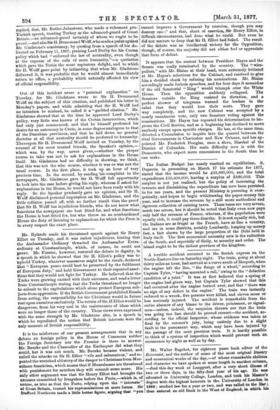Out of this incident arose a "personal explanation" on Tuesday,
for Mr. Gladstone wrote to Sir H. Drummond Wolff on the subject of this citation, and published his letter in Monday's papers, and while admitting that Sir II. Wolff had no intention to mislead, he called it a "garbled citation." Mr.
Gladstone showed that at the time he approved Lord Derby's policy, very little was known of the Cretan insurrection, which had only just commenced, and that he himself professed his desire for an autonomy in Crete, in some degree analogous to that of the Danubian provinces, and that he laid down no general doctrine at all that neutrality should be preferred to humanity. Thereupon Sir H. Drummond Wolff invited on Tuesday, by the counsel of his most trusted friends, the Speaker's opinion,— which was, by the way, never given,—whether the proper course to take was not to ask for explanations in the House itself. Mr. Gladstone had no difficulty in showing, we think, that this was not the wise course, whether it was or was not the nsual course. In the first place, it took up an hour of very precious time. In the second, by sending his complaint to the newspapers, Mr. Gladstone gave Sir H. Wolff full opportunity to look into the case before giving his reply, whereas if asked for explanations in the House, he would not have been ready with his reply. So the Speaker prudently gave no opinion, and Sir H. Wolff disclaimed personal imputation on Mr. Gladstone, and the little collision passed off, with no further result than the proof that Sir H. Wolff has injudicious friends, who do not know what functions the newspapers are best fitted for, and what functions the House is best fitted for, but who throw on an overburdened House the duty of listening to explanations for which the Press is in every respect the exact place.


































 Previous page
Previous page